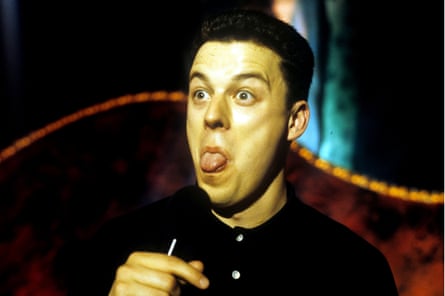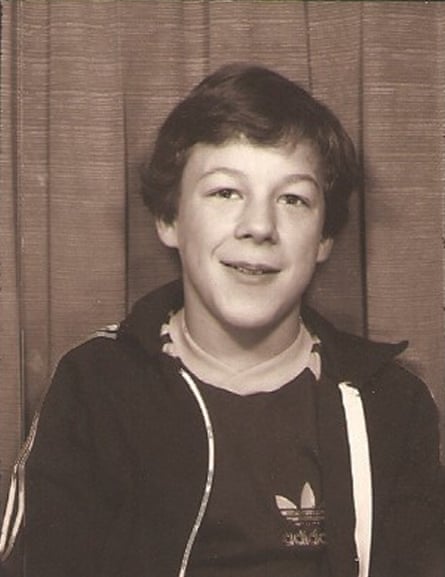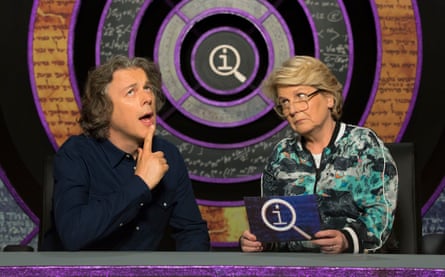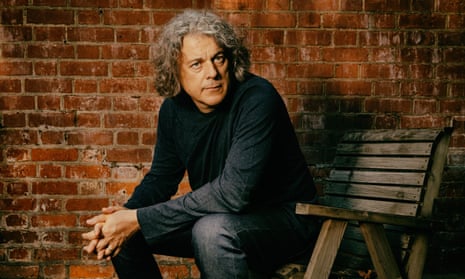Your memoir details personal experiences you have never talked about in public before. This includes the abuse you suffered as a child, at the hands of your father, after your mother’s death from leukaemia. Why write about these experiences now?
I kept feeling their presence in their absence from so many parts of my life. I didn’t have the courage, strength or fortitude to confront them. They were never in my comedy. I’d always been focused to get to the next milestone, the next show, the next fringe. I’d also already written a memoir [2010’s Teenage Revolution: Growing Up in the 80s] but all the things that mattered were missing.
In 2016, you started a part-time MA in creative writing at Goldsmiths University. Was that to help tell this story?
I wanted to get this material out of myself, but I was writing about my life in the third person at first, workshopping it as short stories. Then, towards the end of the first year, I wrote something for an assessment, which became a chapter in the book, relatively unchanged [a chapter called Hands, which details the first incident of sexual abuse Davies suffered, at the age of “eight or nine”]. The assessment just had my student number on it, so it felt safe to write it. The tutor feedback was anonymous, too. It allowed me to present a version of myself where nothing was concealed from view.
How did your classmates find having Alan Davies in their midst?
They were good as gold [laughs]. I kept my part in that by not namedropping in the refectory.
Shortly after you wrote that chapter, your stepmother contacted you about a cache of pornographic images of adolescent boys she had discovered that belonged to your father. Just Ignore Him begins with you looking at them, after driving away from your childhood home. Why start there?
Because that’s when the sky fell in a bit. I also thought, ah, I now have an angle to my book – I can take a course of action in the present day on behalf of the boy that I was.
How was that as a process?
Full of fear. I had lots of conversations with friends, trusted readers, lots of one-on-ones in restaurants in London, and many said: “Look, are you sure you want to do this? Are you sure you want to go public?” But I knew I wanted to tell the world about my story, and my mother’s story. I also wanted to tell people they could talk about their own stories, even if they had never talked about them before. I’ve become a huge enemy of silence and secrecy. I regard them as the twin evils.

You also reveal that your mother wasn’t told she was terminally ill when she was dying in hospital. This was your father’s wish. Is it fair to say that this is a book about what men have been allowed to get away with within their families, and within society?
Yes. My book is very much about that. It’s relevant that I’m a father now, too. Seeing my sons pass through the ages that I was when my mother died, when my father did what he did… it’s mind-boggling, terrifying. I also learned through writing my book about how men deploy that power. It’s not always about literal strength or aggression, although that can be useful. Sometimes it’s about that person looking for pity or painting themselves as a victim. Sometimes really wicked people can present really well.
Did it feel cathartic to explore that?
Not at all. It felt like going into the fire. Stop running, Alan. Stop hiding. It’s time to face the fire.
You include some letters you found, that your mother sent to your father while she was in hospital. Did that make you feel closer to her?
I had quite a profound moment writing the book, when I really felt she was in the room. I could picture her behind me: it was like I’d conjured her up. I still have real sadness and rage about the way she was treated when she was ill. The anniversary of her dying is coming up soon, and the feeling of wanting to get her back and not being able to is very strong at the moment. I’ve never really had that before. Although that might be because I watched Avengers: Endgame with the kids last night, which is about time travel, isn’t it? [laughs]

You also realised that parts of your comedy career were influenced by her.
I hadn’t forgotten that I used to do this thing that made my mother laugh – lying on the floor, moving my legs around like windscreen wipers. But while writing the book, I realised that in all these routines in my 20s, I’d end up lying on the floor, too. I mean, it’s a very unusual thing for a standup comedian to do, to relinquish that position of power and authority. I did a lot of gigs with Jack Dee, and he never lay on the floor once. Eddie Izzard did everything else, but even he didn’t do that!
Did you learn anything else about your choice of career?
That I needed love, affection and warmth coming my way, even if it was from strangers. I also did some cultural archaeology on myself, and realised I had playfulness from my mother, anger from my dad, and shamelessness from my childhood: the essential principles. Being witty helps too [smiles], but it’s not essential.
How was writing a book different from writing standup?
Comedy is the topsoil. This was digging into the bedrock. Sometimes comedy is moving, touching and affecting, but it’s not normally a punch in the eye.
In the book you talk about reporting your father to the police in 2017, and his court case. This was as his Alzheimer’s disease was progressing. Is he still alive?
As far as I know, yes. He’s in a nursing home. My sister keeps me updated if I ask her.

Your uncle also died of dementia. Did this family history of memory loss influence your need to record your experiences in detail?
I think so, but this book is also for my kids. People have said: “God, you want your kids to read this?” And absolutely I do, when they’re old enough. Knowledge about your life is a gift to children. My littlest boy is always asking: “Where did you go on holiday when you were little, Daddy? What did you have for tea? Which Marvel character did you like?” And I’ll be “the Hulk and Spiderman, of course”, and he’s really pleased with that information. Thinking of that need further down the line was a motivation for me.
Have your kids influenced you creatively?
Not enough. They’ve made me more aware of my bad behaviour!
How has the pandemic affected you?
Covid has been catastrophic for me, my industry and my friends. I’m personally afraid to be in a pub, so the idea of sitting in a room with a hundred people laughing out everything from their lungs… it’s heartbreaking. A friend of mine was very seriously ill with it – he’s OK now, but I know how scary it is. More than anything, I’m furious about the government. I’m furious we locked down so late. I’m furious that they said, very proudly, that they had a rehearsal for a pandemic in 2016, which was an absolute shit-show, then they learned none of the lessons. And to tell people to go to work, without the kit they need not to die at work, then applaud them on the pavement… it’s beyond shameful. It’s enraging.
Lots of male comics of your generation are writing emotional books. Why?
We’re all doing this as individuals, obviously, not all emailing each other going, you doing this? Oh, me too! But we’re all living in the same soup, and I’ve learned over the years that if you’ve had an idea to do something, then someone else definitely has, too. But I think it’s interesting that this is happening when no one is really looking for white middle-aged men.
What do you mean?
I mean we’ve had it all our own way for a very long time. When I auditioned to be Jonathan Creek, I was one of 38 white men. When I made the pilot for QI, I was one of five white men on the panel. I was one of five white men on lots of panels, for years. Nowadays, there is a movement to redress the balance, and publishers are looking for more women and people of colour, and in the middle of all that, here are white middle-aged men writing about their actual life, emotions and feelings. They’ve stopped trying to concoct a version of themselves to present to the world. They’ve started to tell the truth.
What do you hope for for your book?
Overwhelmingly positive reactions from allcomers. Favourable critical reviews. Lots of readers who enjoy the jokes, are moved at the moving bits, and aren’t unkind, as people often are. I also hope it helps people break away from family secrets. That is what I really want it to do.
